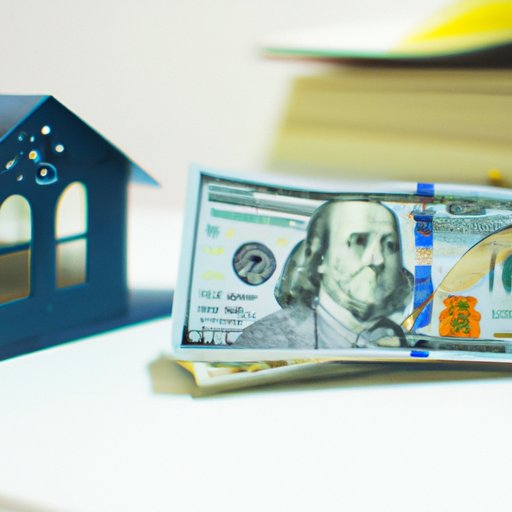
Introduction
Selling your house can be a daunting task, especially if you still have a mortgage to pay off. Many homeowners wonder if they can sell their home with a mortgage and if doing so will affect the sale process. Understanding the ins and outs of selling a house with a mortgage is important to maximize your home equity and ensure a smooth selling process. This article will guide you through everything you need to know to sell your house with a mortgage.
The Ins and Outs of Selling a House with a Mortgage: A Comprehensive Guide
If you have a mortgage on your home, it will affect the selling process. You will have to pay off the remaining loan balance before transferring ownership to the buyer. It is important to check with your lender to see if there are any penalties for paying off your mortgage early. Before listing your house on the market, make sure you have a plan in place to pay off your mortgage.
The next step is to transfer ownership to the buyer. You can do this by completing a mortgage discharge document that releases the lien on your property. Your lender will then provide you with a document that shows the remaining balance and any penalties you may owe. This amount will be deducted from the proceeds of the sale of your home.
One of the common challenges of selling a house with a mortgage is pricing the home correctly. If you owe more on your mortgage than the value of your property, you are said to be underwater. In this case, you may want to consider paying off some of your mortgage to increase your equity before selling your house.
Maximizing Your Home Equity: What You Need to Know Before Selling with a Mortgage
Home equity is the difference between the market value of your property and the amount of outstanding mortgage debt. A higher home equity means you have more equity to put towards your next home or other financial goals. Before selling your home with a mortgage, take steps to increase your home equity.
One way to increase your home equity is to make repairs and renovations. Simple upgrades such as fixing damaged walls or repainting can increase your home’s value and attract more buyers. Another way is to pay off some of your mortgage. The more equity you have in your home, the more profit you can make from the sale of your home.
Timing is also important when it comes to selling a house with a mortgage. You want to wait until your home has appreciated in value so that you can sell at a higher price. Consider hiring a real estate agent to help you determine the right time to sell based on market conditions and your equity.
Breaking It Down: Selling a House with a Mortgage for First-Time Home Sellers
If you are a first-time home seller who wants to sell a house with a mortgage, understanding some common real estate terms can help you navigate the process. These terms may include liens, mortgage discharge, and closing costs.
Here is a step-by-step guide to selling a house with a mortgage for first-timers:
- Paying off the remaining loan balance on your mortgage
- Listing your home on the market and finding a buyer
- Transferring ownership to the buyer, including completing a mortgage discharge document and paying off any penalties
- Closing the deal, which includes paying closing costs and fees such as agent commissions and title insurance
Preparing your house for sale and setting the right price is also important. Research comparable sales and work with your real estate agent to come up with a competitive price that appeals to buyers.
From Negotiating to Closing: Selling Your Home with a Mortgage Explained
Once you have found a buyer, the negotiation process begins. Negotiating with a buyer when selling a house with a mortgage can be tricky as the buyer may want to pay less due to the mortgage balance. Your real estate agent can help you with this process by presenting your home’s positive attributes and negotiating for a fair price.
The next step is closing the deal. A real estate agent can be helpful in this process by arranging for inspections and assessments, helping with paperwork, and coordinating the transaction. You will also need to pay for closing costs, which can include title insurance, attorney fees, and real estate agent commissions.
The Pros and Cons of Selling a House with a Mortgage: Is It Right for You?
Selling a house with a mortgage has both advantages and disadvantages. The main advantage is that you can sell your house even if you still owe on your mortgage. This can be helpful if you need to move quickly or want to use the proceeds from the sale towards another investment or down payment.
However, there are also disadvantages to consider. If you owe more on your mortgage than the value of your property (known as being underwater), you may have to pay some of the remaining balance out of pocket. This can reduce your profits from the sale. Additionally, selling a house with a mortgage can be more complicated and time-consuming than selling a house without a mortgage.
Before making the decision to sell a house with a mortgage, consider factors such as your financial goals, the current market conditions, and your timeline. Consulting with a real estate agent can help you make an informed decision.
Conclusion
If you are considering selling a house with a mortgage, it is important to understand the ins and outs of the process to maximize your home equity and ensure a smooth selling experience. From paying off your mortgage to negotiating with buyers and closing the deal, this comprehensive guide covers everything you need to know to sell your house with a mortgage. Take your time, do your research, and consult with professionals to ensure a successful sale.




